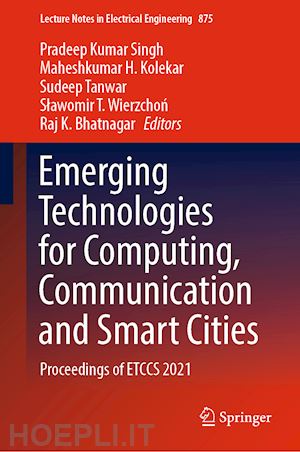
Questo prodotto usufruisce delle SPEDIZIONI GRATIS
selezionando l'opzione Corriere Veloce in fase di ordine.
Pagabile anche con Carta della cultura giovani e del merito, 18App Bonus Cultura e Carta del Docente
This book presents best selected papers presented at the Second International Conference on Emerging Technologies for Computing, Communication and Smart Cities (ETCCS 2021) held on 21-22 August 2021 at BFCET, Punjab, India. IEI India members supported externally. It is co-organized by Southern Federal University, Russia; University of Jan Wyzykowski (UJW), Polkowice, Poland, SD College of Engineering & Technology, Muzaffarnagar Nagar, India as an academic partner and CSI, India for technical support. The book includes current research works in the areas of network and computing technologies, wireless networks and Internet of things (IoT), futuristic computing technologies, communication technologies, security and privacy.
Dr. Pradeep Kumar Singh is currently working as a Professor in Department of Computer Science, KIET Group of Institutions, Delhi-NCR Campus, Ghaziabad, India. Dr. Singh is having life membership of Computer Society of India (CSI), Life Member of IEI and promoted to Senior Member Grade from CSI and ACM. He is Associate Editor of International Journal of Information Security and Cybercrime (IJISC) a scientific peer reviewed journal from Romania. He has published more than 120 research papers in various International Journals and Conferences of repute. He has received three sponsored research projects grant from Govt. of India and Govt. of HP worth Rs 25 Lakhs. He has edited total 10 books from Springer and Elsevier and also edited several special issues for SCI and SCIE Journals from Elsevier and IGI Global. He has Google scholar citations 1451, H-index 20 and i-10 Index 49 in his account. He is section editor of Discover Internet of Things, Springer Journal.
Dr. Maheshkumar H. Kolekar is working as Associate Professor in Department of Electrical Engineering at Indian Institute of Technology Patna, India. He received the Ph.D. degree in Electronics and Electrical Communication Engineering from the Indian Institute of Technology Kharagpur in 2007. During 2008 to 2009, he was a Post-Doctoral Research Fellow with the Department of Computer Science, University of Missouri, Columbia, USA. During May to July 2017, he worked as DAAD fellow in Technical University Berlin where he worked in the research area EEG signal analysis using machine learning. His research interests are in the area of Digital Signal, Image and Video Processing, Video surveillance, Biomedical Signal Processing, Deep Learning. Recently, he has authored a book titled as “Intelligent Video Surveillance Systems: An Algorithmic Approach”, CRC Press, Taylor and Francis Group, 2018. He has successfully completed R&D Project Sponsored by Principal Scientific Advisor to Govt of India on abnormal human activity recognition.
Dr. Sudeep Tanwar (Senior Member, IEEE) is currently working as a Professor with the Computer Science and Engineering Department, Institute of Technology, Nirma University, India. He is also a Visiting Professor with Jan Wyzykowski University, Polkowice, Poland, and the University of Pitesti in Pitesti, Romania. He received B.Tech in 2002 from Kurukshetra University, India, M.Tech (Honor’s) in 2009 from Guru Gobind Singh Indraprastha University, Delhi, India and Ph.D. in 2016 with specialization in Wireless Sensor Network. He has authored two books and edited 13 books, more than 250 technical articles, including top journals and top conferences, such as IEEE TRANSACTIONS ON NETWORK SCIENCE AND ENGINEERING, IEEE TRANSACTIONS ON VEHICULAR TECHNOLOGY, IEEE TRANSACTIONS ON INDUSTRIAL INFORMATICS, IEEE WIRELESS COMMUNICATIONS, IEEE NETWORKS, ICC, GLOBECOM, and INFOCOM. He initiated the research field of blockchain technology adoption in various verticals, in 2017. His H-index is 44. He actively serves his research communities in various roles. His research interests include blockchain technology, wireless sensor networks, fog computing, smart grid, and the IoT. He is a Final Voting Member of the IEEE ComSoc Tactile Internet Committee, in 2020. He is a Senior Member of IEEE, Member of CSI, IAENG, ISTE, and CSTA, and a member of the Technical Committee on Tactile Internet of IEEE Communication Society. He has been awarded the Best Research Paper Awards from IEEE IWCMC-2021, IEEE GLOBECOM 2018, IEEE ICC 2019, and Springer ICRIC-2019. He has served many international conferences as a member of the Organizing Committee, such as the Publication Chair for FTNCT-2020, ICCIC 2020, and WiMob2019, a member of the Advisory Board for ICACCT-2021 and ICACI 2020, a Workshop Co-Chair for CIS 2021, and a General Chair for IC4S 2019, 2020, and ICCSDF 2020. He is also serving the editorial boards of Computer Communications, International Journal of Communication System, and Security and Privacy. He is also leading the ST Research Laboratory, where group members are working on the latest cutting-edge technologies
Prof. Slawomir T. Wierzchon received MSc and PhD degrees in Computer Science from Technical University of Warsaw, Poland. He holds Habilitation (DSc) in Uncertainty Management from Polish Academy of Sciences. In 2003 he received the title of Professor from the President of Poland. Currently he is full professor at the Institute of Computer Science of Polish Academy of Sciences. His research interests include Computational Intelligence, Uncertainty Management, Information Retrieval, Machine Learning and Data Mining. He is an author/co-author of over 100 peer reviewed papers in international journals and international conferences. He published, as author/co-author, 11 monographs from the field of Machine Learning. In the











Il sito utilizza cookie ed altri strumenti di tracciamento che raccolgono informazioni dal dispositivo dell’utente. Oltre ai cookie tecnici ed analitici aggregati, strettamente necessari per il funzionamento di questo sito web, previo consenso dell’utente possono essere installati cookie di profilazione e marketing e cookie dei social media. Cliccando su “Accetto tutti i cookie” saranno attivate tutte le categorie di cookie. Per accettare solo deterninate categorie di cookie, cliccare invece su “Impostazioni cookie”. Chiudendo il banner o continuando a navigare saranno installati solo cookie tecnici. Per maggiori dettagli, consultare la Cookie Policy.